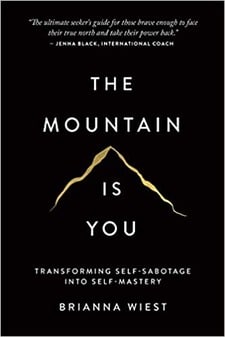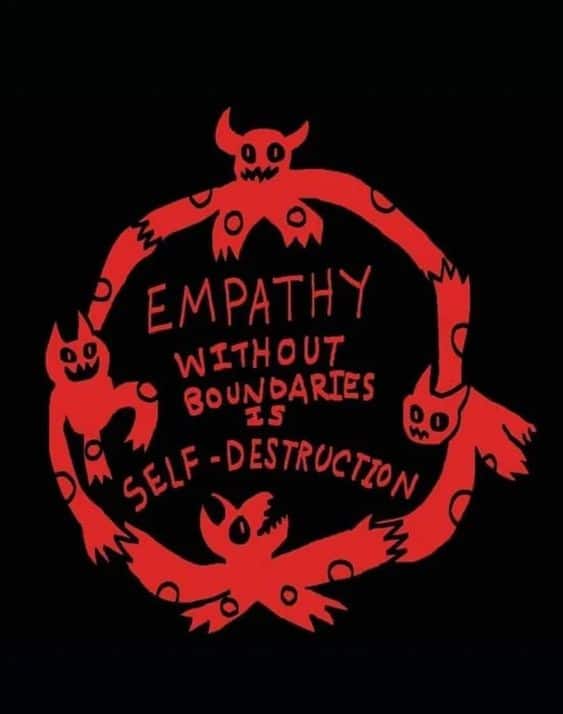“Being mean to yourself first will not make it hurt less if other people judge or reject you, though that is why you are using this defense mechanism. Thinking the worst of yourself is a way of trying to numb yourself to what you really fear, which is that someone else could say those things about you. What you don’t realize is that you’re acting as your own bully and enemy by doing it to yourself. What could someone else’s judgment realistically do to your life? Honestly, it could stop you from pursuing your dreams, ambitions, and personal happiness. And that’s exactly what you’re doing when you stay fixated on those damaging ideas. It’s time to get out of your own way.”
Brianna Wiest, The Mountain Is You (Page 88)
“If we feel bad about not being as successful as another person, we might try to find something negative about them to make ourselves feel better. If we do that every time we come across a person who is more successful than we are, we begin to associate that level of success with being disliked. When it comes time for us to take action to move our lives forward, we’re going to resist doing it, because becoming more successful will create a breach in our self-concept.”
Brianna Wiest, The Mountain Is You (Page 45)
“Without cleanliness, we create fewer opportunities for ourselves. Nothing positive, nor beautiful, flows from chaos. Deep down, we know this. Often, when we are self-sabotaging through disorganization, it is because when we are very clean or organized, we get an uneasy feeling. That uneasy feeling is what we are trying to avoid, because it is the recognition that now that everything is in order, we must get to work on doing what we need to do or who we want to become.”
Brianna Wiest, The Mountain Is You (Page 41)
“When it comes to self-sabotaging behaviors, you have to understand that sometimes, it’s easy to get attached to having problems. Being successful can make you less liked. Finding love can make you more vulnerable. Making yourself less attractive can guard you. Playing small allows you to avoid scrutiny. Procrastinating puts you back in a place of comfort. All the ways in which you are self-sabotaging are actually ways that you are feeding a need you probably do not even realize you have.”
Brianna Wiest, The Mountain Is You (Page 30)
“Self-sabotage is not a way we hurt ourselves; it’s a way we try to protect ourselves.”
Brianna Wiest, The Mountain Is You (Page 28)
In the end, self-sabotage is very often just a maladaptive coping mechanism, a way we give ourselves what we need without having to actually address what that need is. But like any coping mechanism, it is just that—a way to cope. It’s not an answer, it’s not a solution, and it does not ever truly solve the problem. We are merely numbing our desires, and giving ourselves a little taste of temporary relief.”
Brianna Wiest, The Mountain Is You (Page 13)
“On the surface, self-sabotage seems masochistic. It appears to be a product of self-hatred, low confidence, or a lack of willpower. In reality, self-sabotage is simply the presence of an unconscious need that is being fulfilled by the self-sabotaging behavior. To overcome this, we must go through a process of deep psychological excavation. We must pinpoint the traumatic event, release unprocessed emotions, find healthier ways to meet our needs, reinvent our self-image, and develop principles such as emotional intelligence and resilience.”
Brianna Wiest, The Mountain Is You (Page 11)
The Mountain Is You [Book]

Book Overview: This is a book about self-sabotage. Why we do it, when we do it, and how to stop doing it—for good. Coexisting but conflicting needs create self-sabotaging behaviors. This is why we resist efforts to change, often until they feel completely futile. But by extracting crucial insight from our most damaging habits, building emotional intelligence by better understanding our brains and bodies, releasing past experiences at a cellular level, and learning to act as our highest potential future selves, we can step out of our own way and into our potential. For centuries, the mountain has been used as a metaphor for the big challenges we face, especially ones that seem impossible to overcome. To scale our mountains, we actually have to do the deep internal work of excavating trauma, building resilience, and adjusting how we show up for the climb. In the end, it is not the mountain we master, but ourselves.
Post(s) Inspired by this Book:
48 Brianna Wiest Quotes from The Mountain Is You on Self-Sabotage and Healing
“We can sometimes exploit a disaster to block internal change. Like Elizabeth, we can take on a catastrophe to stop ourselves feeling and thinking—and to avoid responsibility for our own intimate acts of destruction.”
Stephen Grosz, The Examined Life (Page 145)
“Sometimes we might try to assume responsibility for a major disaster in order to avoid responsibility for our own destructive behaviour.”
Stephen Grosz, The Examined Life (Page 143)
“‘Success has ruined many a man,’ Benjamin Franklin once said. This is true enough, but what Franklin didn’t mention is that we often work the ruin upon ourselves.”
Stephen Grosz, The Examined Life (Page 132)
